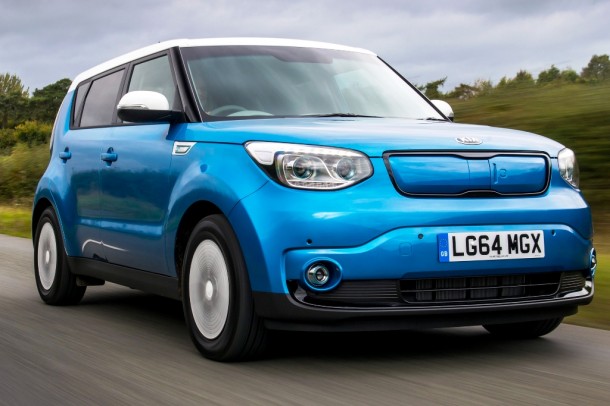Kia brings Soul EV to UK market place

KIA has become one of the few carmakers selling a battery-electric car in the UK.
The Korean manufacturer has today put its Soul EV into the market place. It comes in only one model, which costs £24,995 after deducting the Government’s £5,000 plug-in car grant.
The Soul EV is the result of almost 30 years of research and development by Kia into the feasibility of electric cars. Now, with battery technology having reached a mature stage and emissions-based taxation providing an incentive for consumers to ‘go electric’, the time is right for the Soul EV.
All those years of research have endowed the Soul EV with a range of up to 132 miles (212 kilometres) on a single charge. Kia and SK Innovation, a division of Korea’s largest petro-chemicals company, have developed innovative lithium-ion polymer batteries with a greater energy density – 200 Watt-hours per kilogram of weight – than those in any comparable model. A heating and cooling system keeps them at an optimum operating temperature, which helps to extend the Soul EV’s range.
Further contributions to the class-leading range include the nickel-rich material used for the cathodes (the terminals from which the electric current leaves the batteries); regenerative braking, which tops up the batteries when coasting or slowing down; a unique air conditioning system which can be set to heat or cool only one side of the car when the driver is travelling alone; additional aerodynamic features beneath the car compared with the combustion-engined version; and super-low-rolling-resistance tyres, which can reduce energy consumption by as much as ten per cent over regular low-rolling-resistance tyres.
The Soul EV’s batteries have an energy storage capacity of 27 kilowatt-hours – more than its competitors. They are mounted beneath the car in a special casing which protects them from stone or gravel damage and spray thrown up by the wheels. The ducts to heat and cool them are located beneath the rear passenger seats.
The remainder of the electric drive components are mounted beneath the bonnet, where the internal combustion engine would normally be located. Because an electric motor requires less cooling than a petrol or diesel engine, the front of the Soul EV has been blanked off where the radiator grille would normally be found. This brings aerodynamic benefits.
The charging ports are hidden behind a panel in this blanked-off section. Owners have the option of recharging the batteries from a standard domestic socket, via the Kia-branded wallbox supplied as standard with the Soul EV or at a public fast charger, or through a public rapid charger.
Using a UK 230-volt domestic power supply, the Soul EV can be fully recharged in 10 to 13 hours. With the wallbox or at a public fast-charge point, the time is reduced to around five hours. The Soul EV is supplied with a customised red adapter cable stored in a smart Kia-branded pouch for this form of charging.
Alternatively, through a public rapid charger the batteries can be topped up to 80 per cent of capacity – the maximum permissible with this type of system – in 33 minutes.
The car has a fun-to-drive character. Its electric motor develops 81.4 kilowatts – the equivalent of 109bhp in a combustion-engined model – with 285Nm of torque available immediately upon drive-away. This makes the Soul EV particularly brisk in the kind of stop-start urban driving where it is designed to operate.
It is also extremely smooth and silent – so quiet that it is fitted with a Virtual Engine Sound system at low speeds in both forward and reverse gears to alert pedestrians and cyclists that it is in the vicinity.
The Soul EV has a top speed of 90mph and can accelerate from 0-60mph in 10.8 seconds, so it is perfectly capable of keeping pace with the flow of urban traffic. Of greater relevance, it accelerates on the move, cruises and tackles gradients with minimal power usage, which all contribute towards its long range. It can climb slopes of up to one-in-three.
